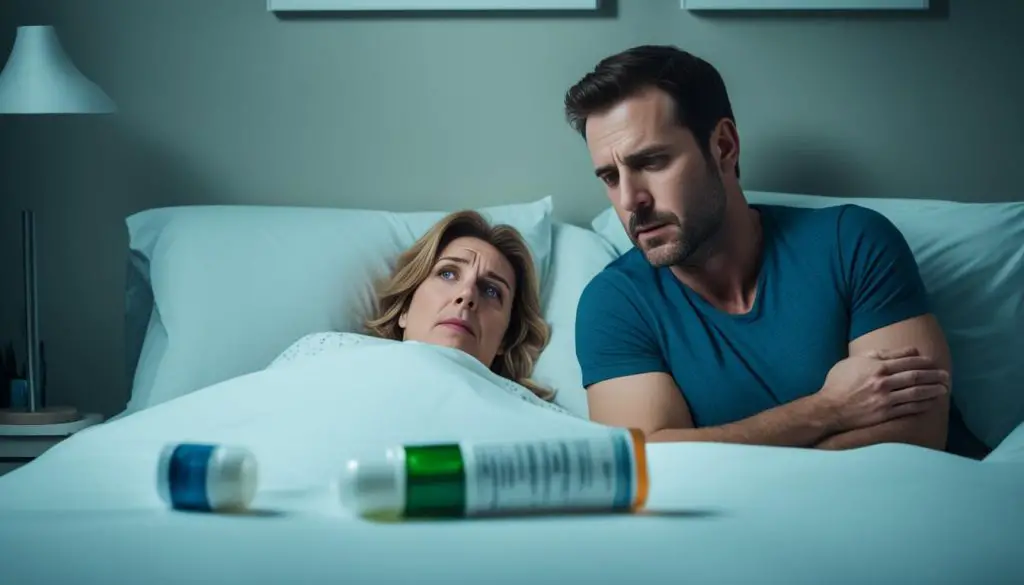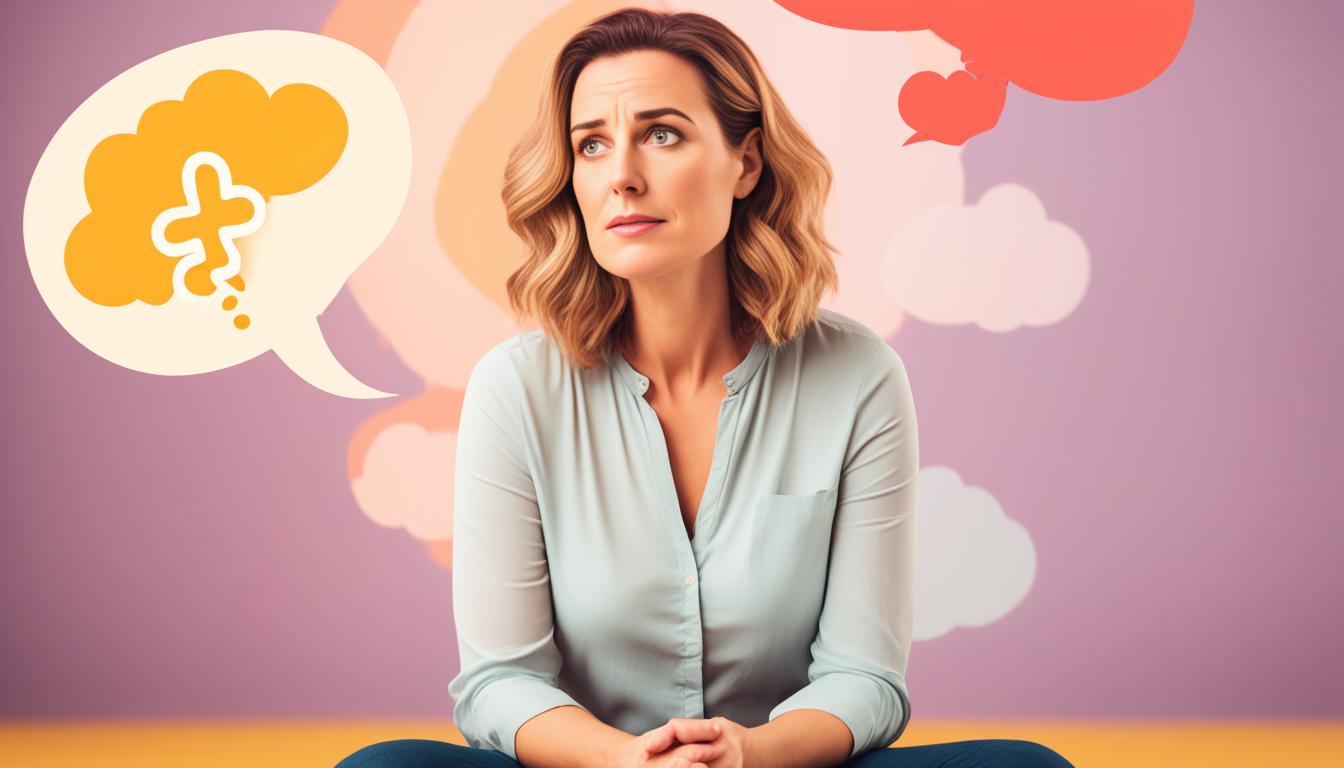Being married to someone with endometriosis and fibromyalgia has shown me many new things. I’ve seen how these conditions can affect a couple’s intimacy and relationship. When we found out my wife had endometriosis, our sex life changed. We had to look at how it had affected us and find new ways to stay close. This made me think, how can couples change their view on sex to deal with endometriosis’ challenges?
Dealing with endometriosis involves many steps. These include medical help, a new lifestyle, support from loved ones, ways to cope, pain management, and sometimes alternative treatments. It’s key for couples to know that endometriosis can affect how they feel sexually and their closeness. Making some changes may be needed to keep their relationship strong.
Studies show that endometriosis can make sex less enjoyable. It can lower your sex drive and satisfaction. This happens because of ongoing pelvic pain, mental health issues, and the impact of treatments like surgery and hormones. So, how can couples keep their bond strong despite these hurdles?
From my own journey, I’ve found that changing our sex goals is very important. You might want to look into other ways to be close or try out new positions to reduce pain. It’s also key to talk openly with your partner about what you both need and can do. By talking openly, getting clear consent, and truly understanding each other, couples can keep their intimacy strong despite endometriosis’s challenges.
However, changing your view on sex is just part of the plan. It’s also key to tackle other parts of living with endometriosis. This means, working on symptom management, looking at different treatments, changing your lifestyle, seeking emotional support, and finding ways to manage pain. Taking a broad approach helps couples deal with endometriosis together and grow stronger.
If you’re interested in learning more about changing your sex expectations and getting through endometriosis as a couple, I strongly suggest this helpful article on adjusting sex expectations for endometriosis. It offers useful tips and insights for managing intimacy and keeping your relationship healthy.
The Impact of Endometriosis on Sexual Function
Endometriosis can affect how individuals feel and act sexually. It can cause changes in wanting sex, getting turned on, and feeling satisfied. A mix of reasons related to the condition lead to these problems.
Chronic pelvic pain is a big issue for those with endometriosis. It makes sex hurt or unbearable for some. As a result, the urge for sex might drop and the number of sexual moments may lessen.
Endometriosis brings along other health problems too. These include feeling sad or worried (depression, anxiety), or being very tired often. These can lower how someone feels about sex and how well they perform sexually.
Some treatments for endometriosis also impact sex. Surgeries or taking certain medicines can have downsides. Surgeries might lead to painful sex due to muscle tension or scarring. Medicines can lower the desire for sex or make the vagina dry.
Being open with healthcare providers is crucial. They can explain how endometriosis and its treatments might affect your sex life. They can suggest things to try to make things better.
Table: Factors Affecting Sexual Function in Endometriosis
| Contributing Factors | Impact on Sexual Function |
|---|---|
| Chronic pelvic pain | Discomfort or avoidance of sexual activity |
| Physical and mental comorbidities | Decreased libido, performance issues |
| Surgical interventions | Pelvic floor tension, scarring, discomfort during intercourse |
| Hormonal treatments | Decreased libido, vaginal dryness |
Everyone handles endometriosis differently. It can affect sex, but there are ways to manage this. Talking to your healthcare team and partner can be very helpful. They might suggest different ways to be intimate. This can help you have a good and joyful sex life despite endometriosis.
Adjusting Expectations: Managing Symptoms and Treatment Options
Managing endometriosis means we have to set realistic goals and understand we might face challenges. Coping with symptoms like pain, tiredness, and trouble getting pregnant takes a mix of treatments, lifestyle changes, and sometimes different therapies. Click here to read about managing symptoms.
Treatments from doctors might include using hormones or surgery. Birth control pills or a device like an IUD might be prescribed to balance your menstrual cycle and lessen symptoms. Surgery, often done with tiny cuts, can take out the problematic tissue and help ease pain.
Changing how we live can also have a big effect on managing the disease. Eating a diet full of fruits, veggies, and whole grains gives your body needed vitamins and helps you stay healthy. Being active lowers inflammation and makes you feel better. Learning to manage stress by using techniques like meditation can also offer some relief.
Some people explore different paths to help, like acupuncture or natural supplements. But, before you start any new method, make sure to check in with your doctor. They can tell you what’s safe and what might work.
Talking closely with your doctor to create a plan that fits your needs is important. This way, you can manage symptoms best and live a fuller life by knowing what to expect and trying various treatments.

Treatment Options for Endometriosis
| Treatment Option | Description |
|---|---|
| Medical Interventions | Includes hormonal treatments and surgery to manage symptoms and reduce endometrial tissue. |
| Lifestyle Changes | Involves adopting a healthy diet, engaging in regular exercise, and practicing stress management techniques. |
| Alternative Therapies | Includes acupuncture, herbal remedies, and dietary supplements that some individuals find helpful. |
Remember, everyone’s journey with endometriosis is their own. What helps one person may not help another. The goal is to find what works for you and improves your health.
Lifestyle Changes for Coping with Endometriosis
Living with endometriosis means making changes to your lifestyle. These changes can manage symptoms and improve your life. By adopting healthy habits and strategies, living with endometriosis becomes easier.
1. Adopting a Healthy Diet
A good diet is key for dealing with endometriosis. Eat plenty of fruits, veggies, whole grains, and lean meats. These foods give your body the nutrients it needs. Foods like fish and flaxseeds, rich in omega-3s, can help fight inflammation. Stay away from processed foods, caffeine, and alcohol as they can make symptoms worse.
2. Engaging in Regular Exercise
Regular physical activity is beneficial for those with endometriosis. Exercise improves blood flow, reduces inflammation, and helps manage pain. You can try walking, swimming, or yoga. Remember to listen to your body and adjust your exercises as needed. Make sure to talk to your doctor before you begin a new exercise plan.
3. Practicing Stress Management Techniques
High stress levels can make endometriosis symptoms worse. Managing stress is important for your health. Deep breathing, meditation, and mindfulness are great ways to reduce stress. You should also make time for activities that you enjoy, like a warm bath or reading.
4. Getting Enough Sleep
Good sleep is vital for anyone dealing with endometriosis. Poor sleep can increase pain, fatigue, and mood changes. Stick to a regular sleep schedule and ensure your sleep environment is comfortable. Avoid caffeine and screens before bed to help you sleep better.
5. Finding Support
Support from friends, family, and support groups is essential. It can provide validation, advice, and emotional support. Online groups are also great places to find support.
6. Consult with Healthcare Providers
Working with healthcare providers is important. They can help create a personalized management plan. Stay in touch with them to get the best care and support for lifestyle changes.
| Lifestyle Changes | Benefits |
|---|---|
| Adopting a Healthy Diet | – Provides essential nutrients – Reduces inflammation |
| Engaging in Regular Exercise | – Increases blood flow – Reduces inflammation and pain – Improves mood |
| Practicing Stress Management Techniques | – Reduces stress levels – Promotes emotional well-being |
| Getting Enough Sleep | – Improves overall well-being – Reduces pain and fatigue |
Emotional Support for Individuals with Endometriosis
Living with endometriosis can be hard, emotionally. It’s crucial to find emotional support. A strong support group helps handle the feelings this condition brings.
Feeling overwhelmed? You’re not alone. Talking to friends and family members can help. They listen, show care, and are by your side when times are tough.
Joining support groups for endometriosis is also great. There, you can share stories, get advice, and meet people who really get it. You can find these groups locally or on the web.
Counselors or therapists can provide excellent emotional support too. Especially those that work with long-term illnesses or reproductive health. They help you cope, manage your feelings, and set realistic goals.
It’s important to know, looking for help shows you’re strong, not weak. It’s fine to ask for help and put your emotions first. With support, you can handle the ups and downs of endometriosis well and keep doing well.
For more info on finding emotional help with endometriosis, check out this article.
Pain Management for Endometriosis
Pain from endometriosis can be bad, making it hard to live life normally. It affects work, physical activity, and close relationships. It’s key to work with doctors to make a plan to handle this pain. A good plan mixes a few ways to treat the pain.
Doctors often start with medicines. NSAIDs can cut down swelling and pain, and they’re good for mild to moderate pain. Sometimes, you might get medicine that changes your hormones, like birth control. This can make your menstrual cycle regular and lessen pain from endometriosis.
Physical therapy can also help a lot. Therapists will show you exercises to lessen pain and help your pelvic floor. These moves make your muscles stronger, more flexible, and less tense. This can cut down pain and boost how you feel.
Using heating pads or taking warm baths can soothe endometriosis pain too. Heating up your lower stomach or back relaxes muscles and eases cramps. Just remember not to use too much heat, so you don’t get burned.
Techniques like deep breathing, meditation, and mindfulness can also be big helpers. They lower pain and stress levels. Doing them each day can make you feel more in control and lessen endometriosis pain.
Alternative Therapies for Endometriosis
Besides traditional medicines, some with endometriosis use alternative therapies. They use these to help with their symptoms. These therapies work with other treatments to deal with endometriosis as a whole.
Acupuncture: It’s a traditional Chinese method. It uses thin needles to adjust energy flow in the body. Many find it helps lessen pain and swelling caused by endometriosis. After having these sessions, some feel less pelvic pain and better in general.
Herbal Remedies: Certain herbs help with endometriosis symptoms. Herbal teas made with chamomile, ginger, and peppermint can ease stomach pain and lessen swelling. It’s crucial to talk with a doctor or an herbalist first to make sure the herbs are safe for you.
Dietary Supplements: Adding some supplements to your diet might help. Omega-3, turmeric, and vitamin D are a few examples. But, you should always talk to a doctor before you start them. They’ll make sure they won’t cause any problems with other medicines you’re taking.
Mind-Body Practices: Yoga, meditation, and mindfulness can be beneficial. They help manage stress and improve how you feel. These practices can lower how much pain you feel and make your mood better. Adding these techniques to your daily life is a good way to handle endometriosis challenges.
It’s essential to understand that not every alternative therapy will work for everyone. Each person’s endometriosis experience is different. What helps one may not help another. Always talk to a health professional before trying something new. They can make sure the treatment is safe and right for you.

| Alternative Therapy | Benefits | Considerations |
|---|---|---|
| Acupuncture | Relief from pelvic pain and inflammation | Consult with a qualified acupuncturist; ensure sanitary practices |
| Herbal Remedies | Potential reduction in abdominal discomfort and inflammation | Consult with a healthcare provider or herbalist; be aware of potential side effects and interactions |
| Dietary Supplements | Support overall well-being and potential symptom relief | Consult with a healthcare provider; be mindful of potential interactions with medications |
| Mind-Body Practices | Stress reduction, relaxation, and improved overall well-being | Incorporate practices under the guidance of a qualified instructor; adapt to personal comfort level |
Alternative therapies can be a helpful addition to managing endometriosis. Remember, they should not take the place of conventional treatments. Working closely with your healthcare team is key. Together, you can create a treatment plan that combines both traditional and alternative methods.
Source: https://www.cmaj.ca/content/195/10/E363
The Impact of Endometriosis on Relationships
Endometriosis affects both the emotional and physical parts of a relationship. The symptoms and challenges it brings can really test a couple. It’s key for partners to talk openly, support each other, and change what’s needed to keep their love strong.
Endometriosis means dealing with pain and tiredness that hits both people in the relationship. It’s important for partners to understand these physical limits. Adjusting expectations helps. This builds a more caring and supporting space for both.
To keep a relationship strong, understanding and flexibility are crucial. The ups and downs of endometriosis, like pelvic pain and fatigue, can make physical intimacy hard. Times like these need more open talks and creative ways to stay close.
Getting professional help like therapy can really make a difference for endometriosis couples. A therapist can teach better communication and help deal with emotional stress. They offer tools to ease the strain on the relationship.
Support groups and web communities also offer help for endometriosis couples. Meeting others who share the same struggles can be really comforting. It gives fresh advice and makes you feel like you’re not alone. This learning from others can be crucial for keeping your relationship healthy.
Facing the challenges of endometriosis and its impact on your relationship together is vital. Remember, changing your expectations, showing lots of support, and getting help when needed are all part of the journey.
If you’d like more insights on handling endometriosis and its effect on relationships, check out this resource.
Adjusting Sex Expectations: Navigating Intimacy with Endometriosis
Living with endometriosis means making changes to your sex life for fulfillment and closeness. It’s key to handle symptoms and talk openly with your partner about what you need and can do.
Consider other ways to be close. This could mean doing things that strengthen your emotional bond. It’s not just about sex; there are many ways to feel close and find joy with your partner.
Changing up positions or activities to avoid pain can be very beneficial. Trying different ways to have sex that won’t hurt can really improve things. It’s crucial to talk openly and share feedback to figure out what’s best for you both.
Being straightforward about your needs and what you can’t do is very important with endometriosis. Talking about what worries you and what you want can make your partner more supportive. It’s all about sharing respect and understanding.
Dealing with endometriosis and intimacy is an ongoing process. You might need to change things as you go. Stay patient and open-minded. Focusing on what brings joy and strengthens your bond can keep your sex life happy and healthy.

- Openly communicate with your partner about your needs and limitations.
- Explore alternative forms of intimacy that prioritize emotional connection and pleasure.
- Try different sexual positions or activities that minimize pain.
- Embrace a mindset that focuses on pleasure, connection, and emotional well-being.
By changing your sex expectations and working through endometriosis challenges, loving connections with your partner can stay strong and beautiful.
For more on handling endometriosis symptoms and seeking help, check out this endometriosis study.
The Divorce Rate and Endometriosis
There isn’t exact data on how endometriosis affects divorce rates, but studies show it might strain relationships. Dealing with endometriosis is hard and can change how a couple gets along. To keep a relationship strong, it’s vital to talk a lot, get support, and adjust what you expect.

Endometriosis brings many challenges like physical pain, emotional ups, and downs, and tough financial choices. These challenges can make a relationship harder. Remember, the effect of endometriosis can be different for every couple.
Talking openly about endometriosis is key. This means sharing your fears, what worries you, and what you hope for. It helps both people understand and show real care for each other. Having a trusting place to share your feelings helps a lot when dealing with endometriosis.
Getting help from doctors, support groups, or therapists who know about chronic illnesses and relationships can really make a difference. They can give you tips, advice, and connect you with others in a similar situation.
Thinking about counseling or therapy might be a good step for some couples. These professionals can help you manage the stresses of endometriosis better. They can also help you talk more effectively and feel closer to each other.
Really, how a couple does when facing endometriosis is about both people being committed and strong. By changing what you expect, finding support, and keeping honest with each other, you can get past the hard parts. With the right care, a relationship can stay strong and loving, even with endometriosis.
Addressing the Issue of Sexless Marriage in Endometriosis
Endometriosis can make desire and activity in the bedroom drop, causing sexless times for couples. Symptoms like pain and tiredness can really lower sexual desire and function. Thus, finding new ways to stay emotionally close is crucial.
Talking openly about the effect of endometriosis on sex is vital. This lets both partners understand each other’s feelings. Navigating sexlessness is easier with open communication. It lets couples find new ways to show love and intimacy.
Finding new types of intimacy is key for endometriosis couples. Things like cuddling or spending quality time together can help. It strengthens the emotional bond without causing too much stress.
Getting help from healthcare experts or joining support groups can be very helpful. They can offer advice on how to handle the tough parts. These professionals give tips on improving communication and finding unique ways to stay close.
Seeking Professional Support for Adjusting Expectations
It’s hard to adjust expectations and cope with endometriosis’ effects on relationships. But, you’re not alone on this journey. Therapists, counselors, or support groups can offer great help. They know all about living with a chronic illness and intimacy.
Professionals experienced with endometriosis can guide you through the condition’s emotional and practical sides. They offer a safe place to share your feelings and fears. Plus, they suggest coping methods specific to your needs.
Therapists can help with talking through the tough times with your partner. They also give advice on maintaining intimacy despite the challenges of endometriosis.
Joining a support group can help too, connecting you with people facing similar issues. This can bring understanding, community, and valuable advice from those who truly get it.
Benefits of Professional Support
Getting help from professionals can make a big difference for those affected by endometriosis. Here’s why:
- Expertise: They’re knowledgeable about dealing with chronic illness and relationship issues. They offer advice and support that fits your situation.
- Validation: Meeting experts and others who know about endometriosis can make you feel seen and understood. This can be very comforting.
- Enhanced Communication: They can coach you and your partner to communicate better. This is crucial for facing the challenges of endometriosis together.
- Coping Strategies: They can teach you useful coping methods for handling the condition’s effects. These skills are important for both you and your partner.
How to Find Professional Support
It’s crucial to find a professional skilled in handling both chronic illness and relationships. Here’s how to locate one:
- Ask for advice from your doctor or others with endometriosis who’ve gotten help.
- Look for therapists and counselors who mention endometriosis in their areas of expertise.
- Think about online options, which can offer help no matter where you are.
- Meet with potential therapists to see if they’re a good match for you and your partner.
Seeking help from a professional is a brave step that can greatly help cope with the challenges of endometriosis. Remember, you don’t have to do it alone.
| Benefits of Professional Support | How to Find Professional Support |
|---|---|
|
|
Tips for Adjusting Expectations and Thriving with Endometriosis
Adapting and thriving with endometriosis involves practical and emotional steps. You should know that everyone’s journey with this condition is different. Finding what works for you is crucial to overcome challenges and live fully.
Accepting the Limitations
Living with endometriosis means knowing its limits. Some days, your symptoms may be worse. It’s perfectly fine to slow down and rest when you need to.
Managing Symptoms
Create a plan to deal with your symptoms. Work with your doctor on treatments like medications, therapies, or surgery. Also, living healthy with exercise, a good diet, and stress relief can reduce your symptoms.
Seeking Support
It’s important to reach out for support. Friends, family, and support groups can offer understanding and comfort. Online endometriosis communities can also give advice and encouragement.
Open Communication in Relationships
Talking openly in your relationships is vital. Share your needs and concerns with loved ones. Educate them about your condition to gain their support. Together, you can tackle the challenges of endometriosis.
Practicing Self-Care
Put yourself first and engage in activities that make you happy and relaxed. From bubble baths to meditation, taking time to care for yourself is key to managing endometriosis well.
Staying Informed
Keep up with the latest in endometriosis research and treatments. This information allows you to make smart health choices and get the best care. Always check with trusted sources for the most accurate updates.
| Tips for Adjusting Expectations and Thriving with Endometriosis |
|---|
| Accept the limitations of the condition |
| Work with healthcare providers to manage symptoms |
| Seek support from friends, family, and support groups |
| Maintain open communication in relationships |
| Prioritize self-care and relaxation |
| Stay informed about endometriosis research and treatments |
Research on the Impact of Endometriosis on Male Partners
There’s limited research on how endometriosis affects male partners. But, what’s clear is that they face big emotional and practical hurdles too. Adjusting Expectations Endometriosis cuts both ways in a relationship. Men may feel many things, from worry to frustration, while picking up extra duties.
There’s often little acknowledgement of male partners’ struggle in care for endometriosis. This lack of support can make them feel left out. It’s key to recognize and support them too. This builds a better, understanding scenario for everyone involved.
More studies are needed to fully grasp the effect of endometriosis on men. But, it’s certain that their mental and emotional well-being is vital throughout the treatment process.
The Importance of Couple-Centered Care in Endometriosis Management
Couple-centered care is key in managing endometriosis. It focuses on the needs of both partners. Health professionals look into how endometriosis affects each person in a relationship. This approach helps by taking care of the emotional and mental parts of the condition. It offers support and info to both partners, improving their communication and bond.
Endometriosis can really challenge a couple’s closeness and happiness. A couple-centered approach helps couples handle these challenges better. It recognizes and deals with the emotions caused by the condition. Plus, it gives useful ways to cope and support each other.
Including both partners in managing endometriosis is empowering. It lets them make decisions together and face problems as a united front. This way of working not only helps the person with endometriosis. It also brings the couple closer and more understanding of each other.
Benefits of Couple-Centered Care
- Enhanced communication: Couple-centered care encourages open and honest communication between partners, fostering trust and shared decision-making.
- Improved emotional support: By addressing the emotional aspects of endometriosis, couple-centered care provides support and validation for both individuals in the relationship.
- Holistic approach: Recognizing that endometriosis impacts all aspects of a couple’s life, couple-centered care takes into account both physical and emotional well-being.
- Shared responsibility: Involving partners in the management of endometriosis allows for shared responsibilities in coping with symptoms, treatment, and lifestyle adjustments.
- Increased patient satisfaction: Couple-centered care leads to higher levels of patient satisfaction as individuals feel valued, supported, and understood.
Ultimately, couple-centered care is essential in battling endometriosis and promoting strong relationships. It looks at how the condition affects emotions and minds. By providing help and strategies, it encourages couples to face endometriosis positively. This strengthens their partnership.
For more on couple-centered care in endometriosis, check out a study by [Author’s Name] et al.
Resources and Support for Couples Adjusting to Life with Endometriosis
Living with endometriosis is tough for couples, yet there’s plenty of help out there. Joining support groups and online communities can make a big difference. They offer not just useful info and a place to belong, but also a chance to connect with others who get it.
These groups share stories, tips, and useful links. This support helps couples feel stronger and more inspired on their journey. Plus, educational resources are key. Articles, books, and papers give deep insights into treating endometriosis and adjusting your lifestyle. For top-notch info, check out the National Center for Biotechnology Information (NCBI).
Don’t forget about counseling too, which can really help. Speaking with experts who understand chronic illnesses and relationships is valuable. It can create a safe place to talk about your worries and work on better coping together. These talks can make your relationship stronger and improve how you both communicate.
It’s important to keep learning and finding support as you deal with endometriosis. By using all the available help, couples can make their relationship even better in spite of the challenges.
